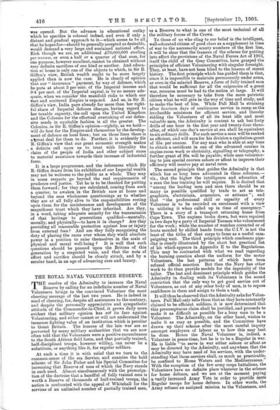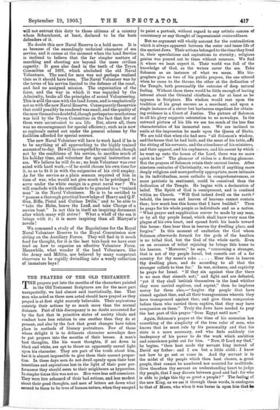THE ROYAL NAVAL VOLUNTEER RESERVE.
THE resolve of the Admiralty to increase the Naval 1 Reserve by calling for an indefinite number of Naval Volunteers brings to the convinced Volunteer the most cheering message of the last two years. He is indeed in need of cheering, for, despite all assurances to the contrary, and despite the personally appreciative and sympathetic attitude of the Commander-in-Chief, it grows daily more evident that military opinion has self its face against Volunteering, and either cannot or will not understand the immense fighting value of an institution which is peculiar to Great Britain. - The lessons of the late war are so perverted by many military authorities that we are now often told that the Volunteers were a positive encumbrance to the South African field force, and that partially trained, half-disciplined troops, however willing, can never be a substitute, or anything like it, for regular soldiers.
At such a time it is with relief that we turn to the common-sense of the sea Service, and examine the bold scheme of Sir John Fisher and his Special Committee for increasing that Reserve of men of which the Navy stands in such need. Almost simultaneously with the promulga- tion of the doctrine that a handful of fully trained men is worth a Reserve of thousands of half-trained troops, the nation is confronted with the appeal of Whitehall for the services of an unlimited number of partially trained men, as a Reserve to what is one of the most technical of all the military forces of the Crown.
To those of us who cling to our belief in the intelligent, well-educated citizen of good class as a supplement in time of war to the necessarily scanty numbers of the first line, it will be clear that the framers of the scheme for putting into effect the provisions of the Naval Forces Act of 1903, itself the child of the Grey Committee, have grasped the principles of efficient Volunteering with singular foresight. They, at least, have not been blind to the lessons of recent history. The first principle which has guided them is that, since it is impossible to maintain permanently under arms, or even in the salaried Reserve, a force of fully trained men that would be sufficient for all the exigencies of a great war, recourse must be had to the nation at large. It will therefore be necessary to take from the more patriotic citizen what he will give in the way of time and study, and to make the best of him. While Pall Mall is straining after fourteen days of continuous service in camp as the irreducible minimum for efficient service, and thereby ridding the Volunteers of all its least idle and most valuable men, the Admiralty is content to ask but forty drills of one hour in the first year and twenty-four there- after, of which. one day's service at sea shall be equivalent to six ordinary drills. For such service a man will be ranked as efficient, and will earn for his division a capitation-grant of 35s. per annum. For any man who is able at any time to obtain a certificate in one of the advanced courses in engine-room work or electricity, signalling or telegraphy, a further grant of 30s. will be payable; while men volunteer- ing to join special courses ashore or afloat to improve their efficiency will receive pay at naval rates.
The second principle that guides the Admiralty is that which has so long been advocated in these columns,— viz., that the higher the intelligence and education of a man the less training he will require. It is desired that "among the leading men and men there should be as many as possible qualified by trade to act as tele- graphists, electricians, armourers, or artisans " ; and that " the professional skill or capacity of every Volunteer is to be recorded on enrolment with a view to utilizing it when called up in time of emergency." There is a story of a transport returning home from Cape Town. The engines broke down, but were repaired in two days by a party of Imperial Yeomen who volunteered for the work ; while the number of watches corrected or of boots mended by skilled hands from the C.I.V. is not the least of the titles of that corps to fame as a useful cam- paigning unit. The third principle which condemns pipe- clay is clearly illustrated by the short but practical list of kit which appears in Appendix E to the Regulations. This may be contrasted with what we read regardinc, the burning question about the uniform for the mote; Volunteers, the last patterns of which have been refused official sanction. But then the Navy has other work to do than provide models for the ingenuity of the tailor. The last and dominant principle which guides the Admiralty in dealing with its Volunteers is the sound conviction that the only way to get good service out of Volunteers, as out of any other body of men, is to repose confidence in them and assign to them a task.
It will thus be observed that the Admiralty asks for Volun- teers. Pall Mall only tells them that as they have constantly claimed to be efficient soldiers, it is now determined that this presumptuous claim shall be justified, and proceeds to make it as difficult as possible for a busy man to be a Volunteer. The Admiralty, on the other hand, wishes to make it as easy as possible, and the Committee have drawn up their scheme after the most careful inquiry amongst employers of labour as to how this may best be done. Hence the Naval Volunteer is, indeed, a Volunteer in peace-time, but he is to be a Regular in war. He is liable "to serve in war either ashore or afloat as may be directed by the Admiralty, and anywhere that the Admiralty may have need of his services, with the under- standing that these services shall, as much as practicable, be confined to Home Waters and the Mediterranean." With the exception of the few army corps battalions, the Volunteers have no definite place whatever in the scheme for home defence, and we are at the moment paying a vastly increased Army Vote in order to provide more Regular troops for home defence. In other words, the- Ariny refuses an assigned mission to the Volunteers, and
will not entrust this duty to those citizens of a country whom Scharnhorst, at least, declared to be the born defenders of it.
No doubt this new Naval Reserve is a bold move. It is so because of the exceedingly technical character of sea service, and it comes at the moment when the land Service is inclined to believe that the far simpler matters of marching and shooting are beyond the mere civilian capacity. It goes also dead in the teeth of the Tryon Committee of 1891, which abolished the old Naval Volunteers. The need for men was not perhaps realised then as it should have been. The Naval Volunteer was by the terms of his service limited to the defence of the coast, and had no assigned mission. The organisation of the force, and the way in which it was regarded by the Admiralty, broke all the principles of sound Volunteering. This is still the case with the land forces, and is emphatically not so,with the new Naval Reserve. Consequently the service that could possibly be rendered was small, and the quality of the men themselves doubtful, though perhaps too much stress was laid by the Tryon Committee on the fact that few of them were accustomed to sea life. But, above all, there was no encouragement for special efficiency, such as is now so copiously meted out under the present scheme by the facilities afforded for special courses.
The new Naval Volunteer will have to work hard if he is to be anything at all approaching to the highly trained seaman of to-day. He will be compelled by emulation, though not by the conditions of his service, to sacrifice much of his holiday time, and volunteer fora special instruction at sea. We believe he will do so ; no keen Volunteer was ever sated with hard work,—if he could choose his own time for it, so as to fit it in with the exigencies of his civil employ. As for the service as a plain seaman required of him in time of war, who would not give much to be privileged to serve under the white ensign in a great naval war ? We will conclude with the certificate to be granted to a "trained man" in the Naval Volunteers. He is to be certified to " possess a thorough practical knowledge of Heavy and Q.F. Gun, Rifle, Pistol and Cutlass Drills," and to be able to " take the Helm, heave the Lead, and take Charge of a service boat." Is not this in itself an inspiring document after which many will strive ? What a whiff of the sea it brings with it; it is more inspiring than all Mirryat's. novels !
We commend a study of the Regulations for the Royal Naval Volunteer Reserve to the Royal Commission now sitting on the Auxiliary Forces. They will find in it much food for thought, for it is the best text-book we have ever read on how to organise an effective Volunteer Force. Meanwhile, what wonder if the land Volunteers, like the Army and Militia, are believed by many competent observers to be rapidly dwindling into a weedy collection of immature boys !







































 Previous page
Previous page